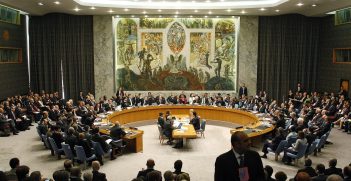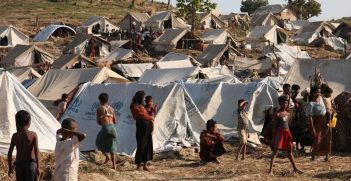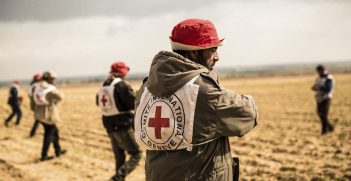Women Across Myanmar Rebuild Communities Impacted by Conflict and Violence

For people living through conflict or violence, unearthing new strength from within themselves every day becomes a way of life. Once ordinary, routine things like putting food on the table, sending children to school, or having clean water to drink can become a constant, unrelenting challenge.
This is a reality for many people living across Myanmar. Here, people face – all at once – the humanitarian consequences of decades-long armed conflicts, the military intervention, and the continuing COVID-19 pandemic.
The International Committee of the Red Cross (ICRC) has been present in Myanmar for over 30 years, including in Kachin, Shan, and Rakhine states. During these years, the ICRC has seen the continuous strength of women in these areas. While the ICRC has provided humanitarian assistance to people affected by conflict and violence, women have been alongside, taking charge of households, supporting their families, and working with their communities. Yet the realities women face in Myanmar are faced by women all over the world.
Moe Moe Nwe is from Thinbaw Kwei Village in Rakhine State. She was working as a labourer in a brick factory but dreamt of being a teacher. One of Moe Moe Nwe’s aspirations is to educate children in her community. “My dream is to become a teacher in this remote village, and I was certain that I was destined to do so,” she told us. “It is tough for teachers from other locations to be sent here, so I decided I wanted to become one for the children here.”
Like many people around her, however, widespread clashes meant putting dreams on hold. And this wasn’t the only impact of the fighting on Moe Moe Nwe. “I was sheltering at a relative’s house when a bullet hit my thigh,” she explained. Her leg was amputated, and she stayed at a monastery in Sittwe with her family. “It was difficult to make a living since I couldn’t work to earn money.”
Things started to change after Moe Moe Nwe received a prosthetic leg from an orthopaedic workshop supported by the ICRC in Sittwe. Since then, she’s been able to take part in another ICRC-supported program – a course to help teach people the art of tailoring. “This is my first time learning how to tailor. I can work from home and make a living with this job,” Moe Moe Nwe says.
Despite the daily challenges, she remains motivated to face them. “Although I can’t work like I used to, I’m thinking of opening a small grocery store and a tailoring shop when I return home,” she says.
A prosthesis also helped Daw Thandar Oo, a mother of two, go back to work as the main breadwinner of her family, supporting her son, daughter, and 70-year-old-mother. She runs a stall in Maungdaw, Rakhine State, selling fried noodles and vermicelli salad.
Thandar Oo lost her leg a couple of years ago when diabetes caused medical complications following a burn injury. “As the diabetes couldn’t be controlled, the wound didn’t heal and the doctor had to amputate my leg,” she says. “The doctor then recommended me to the ICRC for physical rehabilitation.”
She travelled to Sittwe in central Rakhine, like Moe Moe Nwe, to a physical rehabilitation centre supported by the ICRC. There she was provided with accommodation, food, and physical rehabilitation services to help her walk with the prosthesis. In the months that followed, the process of relearning to walk was challenging. “In the early days, I could run around selling my salads, but with this leg it’s hard to keep up with the others. Nonetheless, I would like to tell other people living with disabilities to never lose courage.”
Like many countries living through conflict or violence, Myanmar’s health system is under pressure. The current situation has only exacerbated the strain on health facilities. The longer-term effects this pressure has on access to basic medical services could be devastating, especially for those living in rural areas or already made vulnerable by armed conflicts.
Nang Khin Shwe wants to be part of the solution in the health sector and dreams of becoming a nurse. A couple of years ago, she took part in auxiliary midwife training in her northern Shan State village to move closer to her dream. Much like Moe Moe Nwe, however, intense clashes interrupted these plans. Nang Khin Shwe and her family had to leave their home to escape violence, and she is now living at a displacement camp in Kyaukme Township.
Living in temporary shelter comes with many challenges: heavy rain, extreme weather, vulnerability to COVID-19, and ongoing clashes. Among these challenges, Nang Khin Shwe has been looking after her community, especially the elderly, children, and pregnant women.
“When someone is ill in the camp, I try my best to provide basic health care,” says Nang Khin Shwe. “I mainly provide maternal care to pregnant women in the camp. I’ve helped six pregnant women deliver children.” She refers those with serious illnesses or medical conditions to Kyaukme District Hospital, where they can receive proper medical care.
Roi Seng, a 23-year-old psychology student from Kachin State, volunteers as a mental health counsellor in her community, helping people with trauma and teaching high-school students. “Thinking positively, I meet a lot of people from different backgrounds here. We all have to stay together in this camp, which is a good thing.”
In populated areas, like Kachin State, issues of displacement affect thousands. Bordering India and China, Myanmar’s northernmost state is a beautiful place, known for its cultural, religious, and ethnic diversity. But the landscape and variety have been overshadowed by violent clashes, resulting in families being displaced and living in camps.
In Myanmar, the ICRC provides humanitarian assistance to people affected by armed conflict and other situations of violence. Its response is inclusive of emergency aid as well as long-term assistance. Its projects improve access to clean water, healthcare facilities, and better living conditions, promote international humanitarian law, and spread education about risks related to landmines.
ICRC representatives seek to visit places of detention with an aim to secure better living conditions for all detainees, restore communication between them and their loved ones, and reunite families. Many programs are jointly carried out with the Myanmar Red Cross Society.
Emily Contador-Kelsall is a communications officer with the International Committee of the Red Cross, Australia. Numerous ICRC staff in Myanmar also contributed to this piece.
This article is published under a Creative Commons License and may be republished with attribution.





